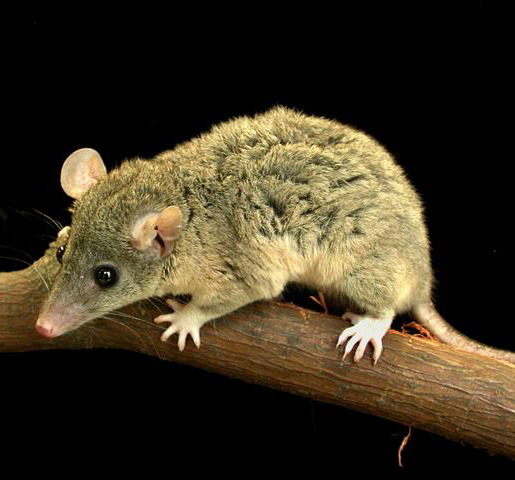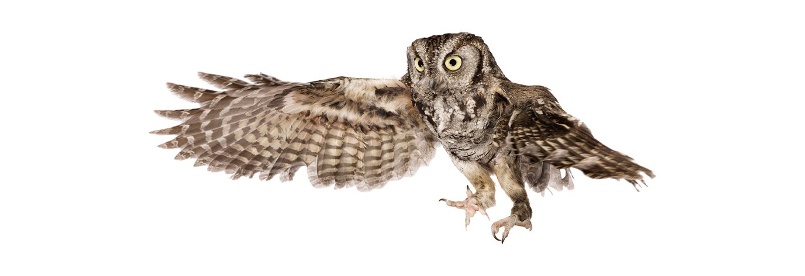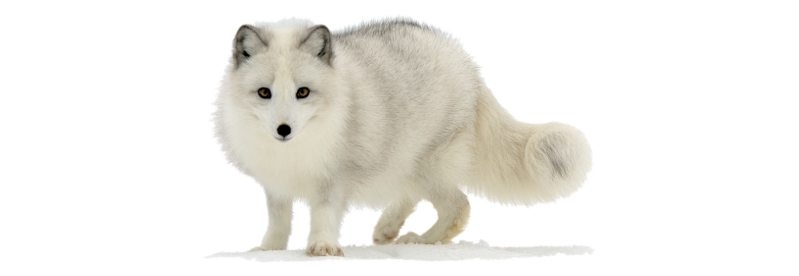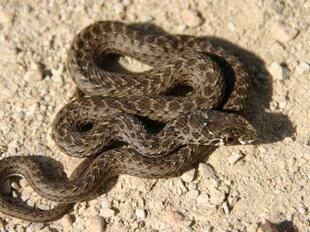
Gray short-tailed opossum(Monodelphis domestica)
Phylum —chordata
Class — mammalia
Order — didelphimorphia
Family — didelphidae
Genus—monodelphis
Appearance
Gray short-tailed opossums are relatively small animals, with a superficial resemblance to voles. In the wild they have head-body length of 12 to 18 cm (4.7 to 7.1 in) and weigh 58 to 95 grams (2.0 to 3.4 oz); males are larger than females. However, individuals kept in captivity are typically much larger, with males weighing up to 150 grams (5.3 oz). As the common name implies, the tail is proportionately shorter than in some other opossum species, ranging from 5 to 9 centimeters (2.0 to 3.5 in). Their tails are only semi-prehensile, unlike the fully prehensile tail characteristic of the North American opossum.
The fur is greyish brown over almost the entire body, although fading to a paler shade on the underparts, and with near-white fur on the feet. Only the base of the tail has fur, the remainder being almost entirely hairless. The claws are well-developed and curved in shape, and the paws have small pads marked with fine dermal ridges.
Habitat
The Gray short-tailed opossum is found generally south of the Amazon River, in southern, central, and western Brazil. It is also found in eastern Bolivia, northern Paraguay, and in Formosa Province in northern Argentina.
Behavior
Gray short-tailed opossumsare nocturnal, being most active in the first three hours after dusk. Although they may occasionally shelter in natural crevices in the rock, they normally spend the day in concealed nests constructed of leaves, bark, and other available materials. The nests of females are more complex and tightly woven than those of males. They are solitary, coming together only to mate, and with each individual occupying a home range of 1,200 to 1,800 m2 (13,000 to 19,000 sq ft), flagged with scent marks. The approach of another member of the species is commonly met with hissing and screeching, which may escalate to defensive strikes launched while the animal is standing on its hind legs.
Diet
Gray short-tailed opossums eat rodents, frogs, reptiles, and invertebrates, as well as some fruit. They hunt primarily by scent, poking their snout into vegetation in search of prey or dead animals to scavenge. Once they find living prey, they pounce onto it, holding it down with their forefeet while delivering a killing strike, often to the base of the neck, with their sharp teeth. They can successfully take prey up to their own size.
Reproduction
The opossums breed year round when the climate is suitable, being able to raise up to six litters of six to eleven young each during a good year. Gestation lasts fourteen days, after which the young attach to a teat, where they remain for the next two weeks. Like all marsupials, the young are born undeveloped; in this species they are just 1 centimeter (0.39 in) in length and weigh 0.1 grams (0.0035 oz) at birth. The young grow hair at around three weeks, open their eyes about a week later, and are weaned at eight weeks.
Gray short-tailed opossums are sexually mature at five to six months of age, and live for up to forty-nine months in captivity.
In captivity
Gray short-tailed opossums are adept at escaping, so whatever enclosure is provided should be made escape-proof. A well-ventilated aquarium (at least 20 gallons) with a tight-fitting lid or a narrow-mesh wire cage should work well. The temperature of the enclosure should be kept at 70 to 80 F.
Bedding should be provided for the opossum. Corn cob litter or shavings (avoid cedar) work well. A nest box is also required, either a commercial, woven nest, or a plastic container like a margarine tub will work, but be sure there are no sharp edges. Tissue or shredded paper (avoid inked newspaper) will be used as nesting material.
Branches for perching and climbing are necessary. Make sure they are non-toxic and have never been treated with any pesticides; parrot climbing toys and ladders also work well for opossums. In addition, a solid-surface hamster wheel can be added to provide an opportunity for exercise. Assure that tails cannot get stuck in the device. They may also like tunnels, cardboard tubing, flowerpots, and other containers to climb through and into. Avoid PVC material that may off-gas.
Gray short-tailed opossums are fairly tidy creatures and will usually pick a corner area to use as a potty; place a litter pan in that location to make cage cleaning easier. These animals are relatively odor-free, and they only need the cage cleaned once per week.
Short-tailed opossum owners and breeders tend to feed a wide variety of things to their animals. It is possible to get commercially manufactured short tail food. Otherwise, a commercial insectivore diet probably provides the best basic nutrition, although some people feed cat food, ferret food, and a variety of other pelleted diets with success.
Look for diets that are high in protein and low in fat. A variety of additional treats should be offered, including mealworms, crickets, fresh fruit and vegetables (offer a variety), and hard-boiled eggs. Other options for quick and easy foods are applesauce and baby foods.
Dry food should be available throughout the day, and live insects or fruit can be offered between one and five times a day. Feeding bigger items such as eggs or chicken is best done at night. Remove the items in the morning if they have not been consumed. Occasionally, special treats can include small amounts of cooked chicken and low-fat yogurt.
Using a general vitamin/mineral supplement is a good idea as well. Water is very important to short tails as they can dehydrate very quickly, so it is vital to make sure their hanging water bottle is always accessible and filled with fresh, clean, and clear (preferably non-chlorinated) water.
 Russian
Russian
 English
English
























